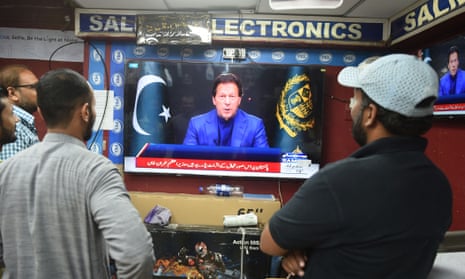Addressing the crowds at a public rally in Punjab last week, Pakistan’s prime minister was on the attack. Western leaders, Imran Khan said, treated Pakistan as their “slave” and presumed that “whatever you say, we will do”.
Days before, it had been announced that Khan would be facing a vote of no confidence in parliament at the end of March, after more than 100 members of Pakistan’s united opposition successfully tabled a motion to oust him. The vote will take place on Friday 25 March.
The prime minister’s opponents, who have put aside their own differences to unite in an anti-Khan coalition, have accused him of bad governance and economic incompetence as inflation has soared and Khan has appeared to lose the backing of the military establishment credited with bringing him to power in the first place.
As he fights for his political life, however, Khan has turned to a strategy he hopes will win him support, even as his government’s popularity is nosediving: brazen bashing of the west.
He was particularly scathing of a recent request by diplomats of 22 countries, including EU member states, who jointly called on Pakistan to support a resolution in the United Nations general assembly condemning Russia’s aggression against Ukraine.
Khan, who has been trying to cultivate a closer relationship with Russia in defiance of the west and was in Moscow on the day of the invasion – saying it was an “exciting time” to be there – point-blank refused, expressing only “concern” at the situation.
According to a narrative being pushed by Khan and ministers close to him, the vote of no confidence is part of a conspiracy by foreign powers in the west, and even the CIA, to topple his government, which is no longer willing to support the actions of the west and Nato as they did during the “war on terror”.
This week, Pakistan’s human rights minister, Shireen Mazari, tweeted, and then deleted, a message accusing the opposition of using “external powers for their devious games”.
On Monday, the foreign minister, Shah Mahmood Qureshi, told a press conference he had intelligence that the vote of no confidence against Khan was happening at the behest of western powers.
“I have more information than this,” Qureshi said cagily, adding that he would only reveal it once he had the green light from the prime minister.
Michael Kugelman, the deputy director of the Asia programme and senior associate for south Asia at the Wilson Centre, said it made “good political sense for Khan to ramp up the anti-west rhetoric”, which would be likely to fire up his support base, who are widely mistrustful of the west, particularly the US, after the heavy price paid by Pakistan during the “war on terror” and amid increasingly hostile US-Pakistan relations.
“If he loses power, he can blame the west and use that as a rallying cry to draw support to prepare for a fresh bid at power,” said Kugelman. “And if he stays in power, he can boast that he defied the west’s efforts to undermine him and use that as momentum to push toward getting elected to a second term.”
Khan’s anti-western rhetoric has also been taken as a sign of the prime minister’s concerns that the vote of no confidence poses a real threat to his ability to stay in power and become the first prime minister in Pakistan to complete a full term in office.
Pakistan’s powerful military, which retains a large amount of power and influence even in a civilian government, is considered by many as largely responsible for Khan’s election win in 2018, though they have denied any involvement. In recent months, however, there has been an apparent widening gap between Khan and the military establishment and it is thought that he will no longer be able to rely on their backing behind the scenes in the vote of no confidence.
An armed forces spokesperson distanced the military from the vote entirely, saying: “I have said it earlier that the army has nothing to do with politics. It is better for all of us to avoid unnecessary speculation on this matter.”
While Khan currently has a majority in parliament with his coalition partners, the opposition claims that it has the backing of at least 20 lawmakers from the ruling party and its allies. That would be enough to lose Khan the vote, currently scheduled for 25 March. Even allies of Khan’s have admitted he could be facing defeat.
Information Minister Fawad Chaudhry told a news conference that they rejected “this culture of turncoats”.
“We are clear that we will not get into any blackmailing to save our government,” said Chaudhry.
Chaudhry Pervez Elahi, the speaker of Punjab’s assembly, who is close to Khan, said: “The united opposition has more numbers than needed. Many surprises will come in the coming days.”
Aasim Sajjad Akthar, an author and associate professor of political economy at Quaid-i-Azam University in Islamabad, said it was no surprise in this moment of political strife that Khan was leaning on anti-western tropes, and in particular the narrative that western civilisation poses a direct threat to Islam.
“Having said this, it is nevertheless a fact that Pakistan’s political and economic history has been shaped by western imperialist powers,” said Akthar. “Whether there is any direct intervention by western governments to ease Imran Khan out of power is something we will know for sure only in the due course of time.”
